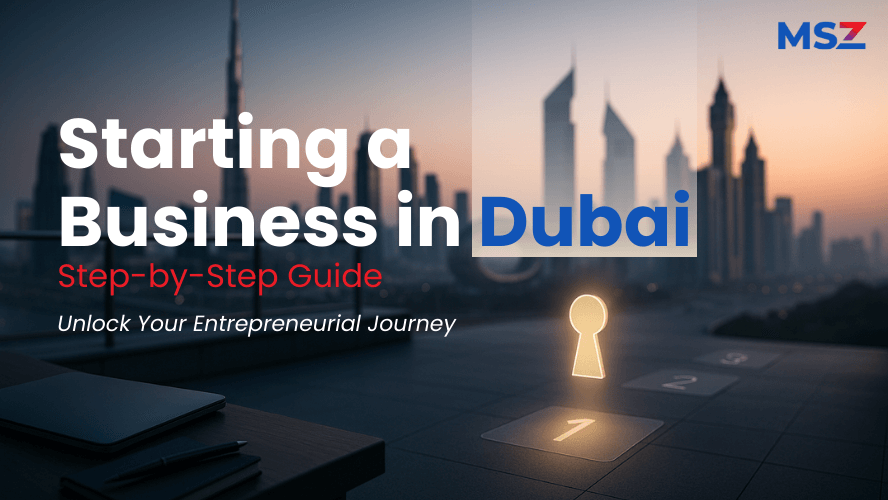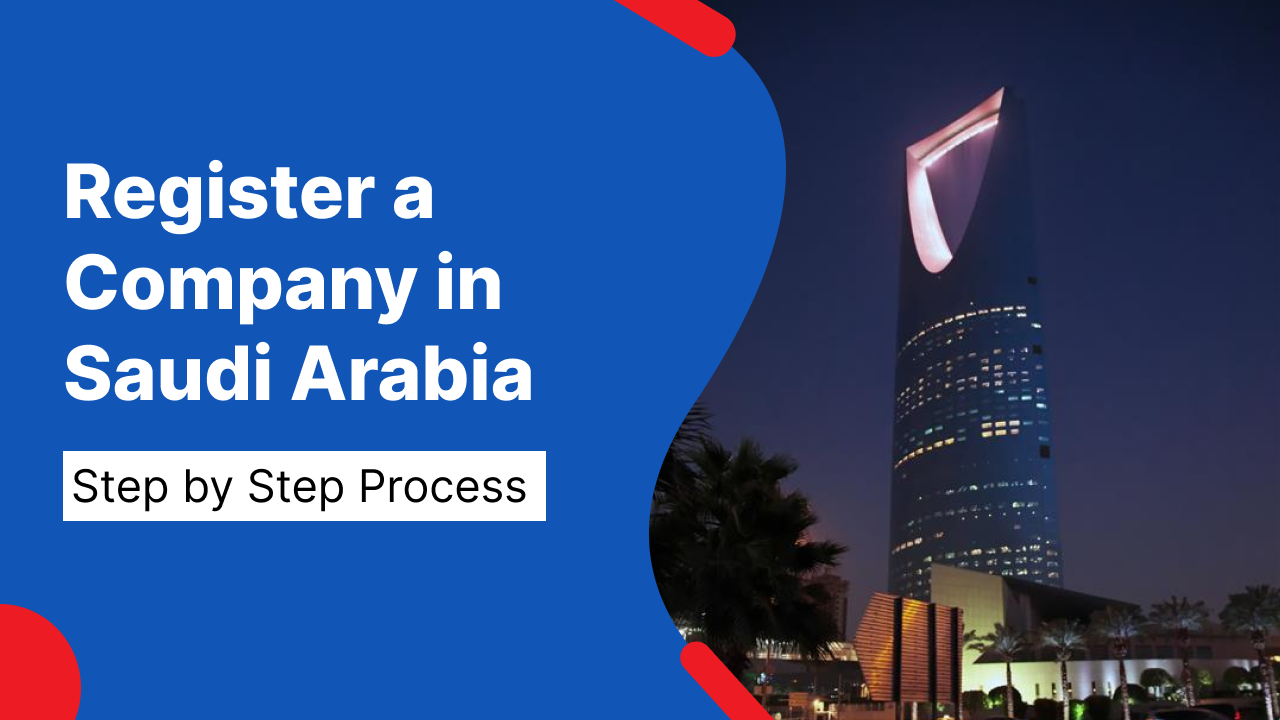
Unlock Your Path to Success in the Heart of the Middle East
Dubai business setup
If you've been scanning the globe for the next big move, Dubai should be blinking bright on your radar. This is not just a city of impressive skyscrapers and high-end shopping malls; it's a place where individuals enjoy no personal income tax and meet, global connectivity, where startups can launch fast and established businesses can scale even faster.
Over the past 20 years, Dubai has evolved from a regional trading hub into a global economic powerhouse, ranking:
- #1 in the Middle East for ease of doing business (World Bank)
- Over 30,000 new companies registered in 2024 alone (DED)
Entrepreneurs here benefit from:
- Zero income tax and corporate tax (0% Corporate tax for Free Zone, and 9% on Mainland taxable profits above AED 375,000).
- 100% foreign ownership for Free Zones and 1500+ Mainland activities.
- Expedited processing for business licensing (as fast as 4 hours for select services via the Dubai Now app).
- World-class infrastructure- home to the busiest international airport and the largest one of the largest sea ports in the region.
With over 40 free zones, a booming digital economy, and access to 4.5 billion consumers within an 8-hour flight radius, Dubai is where ambition meets opportunity.
If you're serious about expanding your business or starting fresh, this detailed guide will take you through everything you need to know - from legal structures and licensing to costs, timelines, and insider tips that most first-time investors miss.
Why Business Setup in Dubai Is a Top Choice for Global Entrepreneurs
Dubai isn't just a flashy skyline - it's one of the smartest moves a business owner can make. Sure, you've heard about zero personal income tax and 100% ownership options, but the real story of Dubai Business setup is how these advantages translate into everyday wins for entrepreneurs.
1. Tax Advantages to Fuel Growth
Dubai's tax setup is built for reinvestment and boosting commercial operations. You get to keep 100% of your income, as most businesses pay no corporate tax (with only a 9% rate on taxable profits above AED 375,000 since mid-2023), and Free Zones waive import & export duties. That's real capital that can be reinvested directly into scaling your business.
2. Global Reach Without the Jet Lag
From Dubai, you can connect with two-thirds of the world’s population in just a few hours. That’s not a small advantage - it changes the way you think about trade, supply chains, and partnerships. Europe, Asia, and Africa are no longer distant markets- they’re easily accessible hubs.
3. A Government That Wants You to Succeed
Dubai’s regulations are built to welcome business, not block it. Company setup is straightforward, licensing is clear, and the rules are updated to stay competitive on a global stage. This isn’t a city where you get bogged down in endless paperwork. It’s a place where you get a fast, clear “yes” so you can start working.
4. A Lifestyle That Attracts Talent
A great business needs a strong team - and a strong team needs a place worth living in. Dubai delivers on every front: modern infrastructure, reliable healthcare, excellent schools, world-class safety, and a mix of over 200 nationalities that make it truly global. It’s a city where work can thrive, but so can life outside the office.
Dubai isn’t just a location for your company. It’s a long-term base for growth, opportunity, and stability - both for the business you’re building and the people who help you build it.
Quick Overview: Dubai Mainland vs. Free Zone vs. Offshore

1. Dubai Mainland Company Setup- Unlock Full Market Access
Access to the Full UAE Market: A mainland license opens the entire UAE to your business. You can sell directly to customers in all seven emirates and even bid for government contracts - a big plus if your focus is on the domestic market.
100% Foreign Ownership: Since 2021, most commercial and professional activities no longer need a local sponsor, so you can keep full ownership of your company. The exception? Certain regulated sectors, like oil and gas or commercial agencies, still require a local partner.
Unlimited Growth Potential: Growth is straightforward. You’re not capped on how many visas you can issue, how many employees you can hire, or where you can open branches. You can expand anywhere in the country without extra hurdles.
Cost: Expect setup costs to fall between AED 25,000 and AED 50,000. It’s a strong fit for restaurants, retail stores, and service providers who want a direct line to the local customer base.
Learn more about Dubai Mainland Company Setup.
2. Dubai Free Zone Company Setup - Perfect for Global Trade
100% Foreign Ownership: In a Free Zone, you keep full ownership of your business. No local partner. No shared control.
Tax Advantages: The tax setup is straightforward - no corporate tax, no personal income tax, and no import or export duties. For companies that deal mostly with overseas markets, that’s a major cost advantage.
Industry-Specific Zones: Free Zones often focus on specific industries. Tech firms gravitate to Dubai Internet City. Media companies cluster in Dubai Media City. Logistics and trade operators prefer Jebel Ali Free Zone. Each one is built with facilities and services designed for its sector.
Cost: Costs vary. Most setups fall between AED 12,000 and AED 40,000, depending on the Free Zone and your business requirements.
Limitations: There’s one catch - you can’t sell directly into the UAE market from a Free Zone. To reach local customers, you’ll need a mainland branch or a local distributor.
Learn more about Freezone company setup.
3. Dubai Offshore Company Setup- Perfect for Asset Protection
Ideal for Holding Companies: Offshore companies are perfect for asset management, intellectual property (IP) holding, and conducting international trade without a physical presence in the UAE.
Privacy & Protection: One of the biggest draws is privacy. Offshore jurisdictions keep ownership details and financial records out of public view, which appeals to investors who prefer to keep their business dealings discreet.
Zero Taxes: Simple Tax - no corporate, personal, or capital gains tax. That’s money you can keep or reinvest in other ventures without worrying about local deductions.
Global Focus: These companies are built for international reach. You can trade and operate globally, but you can’t run a business inside the UAE under this setup. It’s purely for cross-border operations.
Cost: Expect setup costs to fall somewhere between AED 10,000 and AED 18,000, depending on the jurisdiction you choose and the level of service you need.
Learn more about Dubai Offshore company setup.
9-Step Dubai Business Setup Process: A Practical Guide for Entrepreneurs
 Starting a business in Dubai isn't just about filling out forms and paying fees - it's about making the right choices from day one so your company can thrive in a market that's fast-moving, competitive, and globally connected. Below, I've broken down each step you'll need to take, what's involved, and how to do it without hitting costly roadblocks.
Starting a business in Dubai isn't just about filling out forms and paying fees - it's about making the right choices from day one so your company can thrive in a market that's fast-moving, competitive, and globally connected. Below, I've broken down each step you'll need to take, what's involved, and how to do it without hitting costly roadblocks.
Step 1: Identify Your Business Activity
Before you can even think about paperwork, you need to be clear on what your business will actually do in Dubai. This isn’t just a formality - your chosen activity determines:
- Which government department will issue your trade license
- What legal structure you’re allowed to set up
- Whether you’ll need extra approvals before starting operations
Dubai classifies activities into Commercial, Industrial, and Professional:
- Commercial - Trading, retail shops, eCommerce, import and export
- Industrial - Manufacturing, product assembly, large-scale production
- Professional - Consulting, IT services, design studios, education, healthcare
Insider Tip: Specialized department approvals are necessary for activities such as healthcare, education, and food services. For instance, a medical clinic needs Dubai Health Authority approval, and a food outlet requires Dubai Municipality approval. Make allowance for this in your schedule to prevent delay.
Mistake to Avoid: Selecting an activity solely because it "sounds close" to what you are doing. Activity names in Dubai are specific. The wrong choice can result in licensing complications, fines, or having to reapply later - that's wasted money and time.
Step 2: Pick the Right Legal Structure
Your legal structure affects liability, ownership rights, and even how easily you can expand in the future. Popular options include:
- Limited Liability Company (LLC) - The go-to for mainland setups. Offers flexibility and allows trading anywhere in the UAE market. Know more about how to open a LLC Company.
- Sole Establishment - Perfect for single-owner professional services.
- Branch Office - Ideal if you're a foreign company looking to operate in Dubai without creating a separate legal entity.
Insider Tip: If your target market is predominantly within Dubai or the broader UAE, a mainland LLC offers you the most flexibility. If you're more internationally oriented, a Free Zone company might offer greater tax and operational advantages.
Mistake to Avoid: Selecting a Free Zone without verifying whether your business requires mainland access. Free Zone firms usually can't sell straight into the local market without a distributor or mainland office - a surprise for many new investors to regret.
Step 3: Select and Reserve Your Trade Name
Trade names matter in Dubai. Your name must:
- Avoid religious, political, or offensive words.
- Include the business activity if required.
- Avoid abbreviations unless they match your personal name or registered trademark.
Insider Tip: Check domain name availability at the same time. Having a consistent company name and website address makes your brand more discoverable.
Mistake to Avoid: Thinking you can "tweak" your desired name later. If your name is rejected, you'll be forced to reapply - which can derail your setup timetable.
Step 4: Get Your Initial Approval
Initial approval is the government's "no objection" for you to begin business. It's suitable for six months, which provides you with time to:
- Finalize your office space.
- Gather required documents.
- Secure other approvals if needed.
Insider Tip: Get initial approval as soon as you have decided on your activity and structure. It's one of the quickest steps in the process - sometimes only a day or two - but it opens up everything else.
Mistake to Avoid: Allowing your approval to lapse. If you lose the six-month window, you'll have to reapply and may have to pay the fee once more.
Step 5: Secure Office Space
Whether it's a Free Zone desk or an entire commercial floor on the mainland, getting an office space requires a registered address:
- Mainland: Requires an Ejari (tenancy contract) registered with the Dubai Land Department.
- Free Zone: Offers flexible options like Flexi-desks, shared offices, or private suites.
Insider Tip: Even if your company is virtual in its central location, having a small, modest office can make banking account opening easier - banks view it as evidence of actual operations.
Mistake to Avoid: Signing a long lease before receiving your trade license. If your configuration encounters a snag, you may be locked into paying for space that you can't yet use.
Check out this blog on 7 essential factors to look when selecting a business location in Dubai.
Step 6: Finalize Your Dubai Trade License
This is where your business gets legally established. Send all papers to your preferred authority:
- Mainland: Dubai Department of Economy and Tourism (DET, formerly DED).
- Free Zone: The respective Free Zone Authority.
For a Trade License, you'll need:
- Your initial approval.
- Trade name reservation.
- Office lease or Ejari.
- Passports and visa copies for shareholders.
Insider Tip: Re-check the authority's checklist - Free Zones tend to need fewer papers than the mainland.
Mistake to Avoid: Underestimating minor details such as passport validity. Your application can be rejected by the authorities due to something as minor as a copy of an expired passport.
Step 7: Open a Corporate Bank Account
Dubai's banking sector is advanced, but compliance is strict. For a Corporate bank account, expect to provide:
- Your Dubai trade license.
- Office lease.
- Shareholder passport copies, resident visas and Emirates ID
- A detailed business plan.
- Prospective clients and suppliers' names and country details.
Insider Tip: Shortlist banks by your transaction requirements. If you will be making lots of international payments, consider banks that have solid global networks, such as Emirates NBD.
Mistake to Avoid: Waiting too long to open the account. Without it, you can't pay suppliers, get paid, or manage payroll - it's a bottleneck to growth.
Step 8: Apply for Visas
The final operational step: securing Dubai business visas for yourself, your partners, and your staff. The number of visas you can obtain is determined by the size of your office and the type of business you operate.
Types include:
- Investor/Partner Visa - Dubai Investor Visa is designed For shareholders.
- Employee Visa - For staff, based on quota.
- Golden Visa - For high-net-worth individuals, investors, or entrepreneurs [AED 2M+ investment, or startup funding > AED 500K approved by Dubai SME]. For more details, visit - https://mszconsultancy.com/the-uae-golden-visa/
Insider Tip: Get your visa first - it eases the sponsorship of family members subsequently.
Mistake to Avoid: Overestimating your quota. Authorities assess it based on office space, so check your lease terms before committing to hires.
Step 9: Final Registrations & Compliance
These last steps ensure you're fully compliant and credible in Dubai.
- Dubai Chamber of Commerce: Required for most mainland trading/professional companies; 1-2-day process. Free Zone firms are typically exempt but may opt in for networking benefits. Check more about Dubai Chamber of Commerce Registration.
- VAT Registration: Mandatory above AED 375K/year turnover; voluntary above AED 187.5K. Apply via the FTA portal.
- Sector-Specific Registrations: E.g., Dubai Municipality (food), DHA (healthcare), KHDA (education).
- Pro Tip: Don't delay VAT registration when required - fines start at AED 10K.
Cost Breakdown for Dubai Company Formation (2025 Estimates)
| Setup Type | First-Year Cost (AED) | Renewal Cost (AED) |
|---|---|---|
| Mainland LLC | 25,000 - 50,000+ | 15,000 - 30,000 |
| Free Zone Company | 12,000 - 40,000+ | 8,000 - 25,000 |
| Offshore Company | 10,000 - 18,000+ | 6,000 - 12,000 |
Tip: Always budget 20-30% extra for unforeseen expenses - such as extra approvals, additional visas, or branding/marketing. Checkout this cost of business setup blog for more details.
Post-Setup Essentials
- Accounting & Compliance - Keep VAT and corporate tax filings up to date.
- Hiring - Leverage Dubai's diverse talent pool, but understand labor laws.
- Marketing - Invest early in digital presence; Dubai consumers are tech-savvy.
- Networking- Attend trade shows like GITEX, Arab Health, and Cityscape.
What Nobody Tells You About Dubai Business Setup (But You Need to Know)
Common mistakes to avoid while setting up a business in Dubai-
1. Choosing the Wrong Jurisdiction
Picking a mainland trade license when you only need an international trade? Or a Free Zone when targeting local clients? This fundamental error can cost you 20-50% more in unnecessary fees and compliance headaches. Always match your jurisdiction to your actual customer base and operations.
2. Underestimating True Costs
That "AED 15,000 startup offer" usually doesn't include compulsory costs such as visas (AED 5-6K per employee), health insurance, office deposits, and trade license renewals (usually 30-50% of initial charges). Allow at least 40% over published prices.
3. Compliance Blind Spots
Dubai officials don't extend grace periods- late renewal of licenses attracts AED 1,000/day penalties, and visa infractions result in outright bans. A single missed document will freeze your bank account.
4. Surface-Level Market Research
Assuming "no competition" because you don't see local stores? Most Dubai consumers shop worldwide online. Your actual competitors are international brands already ruling through Amazon.ae and social media.
5. Neglecting Cultural & Legal Nuances
Your brand name, marketing material, or even product packaging could conflict with UAE standards. From modesty expectations (graphic / imagery) in advertising to prohibitions on specific product categories, neglecting these can result in denied approvals and expensive rebranding before you even open.
Check out this detailed infographic - https://mszconsultancy.com/infographics/common-business-setup-mistakes-to-avoid/
Legal & Compliance Requirements
Starting a business in Dubai isn't simply a matter of obtaining your trade license; it's about being compliant from day one. The UAE is serious about regulatory compliance, and omitting the fundamentals can lead to hefty fines or even a business shutdown.
Know the Core Laws
- UAE Commercial Companies Law: Regulates company structures, shareholder rights, and rules of operation. Whether you are an LLC, a sole proprietorship, or a branch office, this law provides the template for how you are set up.
- Labor Law Essentials: Regulates employment contracts, working hours, entitlement to leave, and termination provisions. If you are going to employ staff, you need to meet the Ministry of Human Resources & Emiratisation (MOHRE) requirements. Learn more about Dubai employment laws.
Essential Documents & Registrations
- MOA (Memorandum of Association): States your business's activities, ownership levels, and how decisions are made. This needs to be notarized and in line with your licensed activity.
- Ejari: The registration of the tenancy contract in Dubai is needed by the majority of mainland companies. Without it, you are unable to complete licensing or sponsor employee visas.
- VAT Registration: Compulsory if your turnover for the year is more than AED 375,000. Even below the threshold, voluntary registration can increase credibility and enable you to recover input tax credits. Learn more about VAT and Tax Regulations for Businesses in Dubai.
Why It Matters These aren't merely bureaucratic hurdles- they safeguard your rights, keep you in the good books of the law, and provide you with the credibility to secure larger contracts. Dubai's regulatory environment is open, but it's ruthless if you let your attention slip.
Business Etiquette & Market Tips
Conducting business in Dubai is not merely a case of having the correct paperwork- it's a matter of having the proper connections. In the UAE, trust tends to precede contract, and an awareness of culture can unlock doors that money cannot.
Cultural Do's & Don'ts
- Do greet with a handshake (right hand only) and maintain polite conversation before jumping into business matters.
- Do dress modestly in meetings- business formal is still the norm.
- Don't schedule meetings during prayer times or the holy month of Ramadan without checking first.
- Don't engage in heated debates or make public criticisms; maintaining respect is paramount in Emirati culture.
Market Savvy Dubai is a melting pot of more than 200 nationalities, so your client base will be as cosmopolitan as it comes. Customize your marketing to several cultures while still being sensitive to local values- Arabic content and English content both count.
Networking Power Moves
The UAE thrives on personal connections. Attend industry mixers, trade fairs like GITEX, and business councils to build rapport with decision-makers. Many deals happen over coffee before they happen in a boardroom.
Need an edge on the right events? See our handpicked UAE Networking Guide for high-quality conferences, exhibitions, and exclusive meetups where your next client or investor could be sitting on the other side of the table.
In short, know the culture, work the network, and you'll find that in Dubai, relationships are your most valuable currency.
MSZ is a part of one of the largest and most successful global networking organizations BNI, we represent in 4 chapters and will be able ot connect you with the industry leaders and business associates. Read more…
Final Word:
Dubai isn't just a place to do business - it's a springboard into some of the fastest-growing economies in the world. But success here comes to those who plan smart, choose the proper structure, and stay compliant.
Whether you're launching a startup or expanding your multinational footprint, get the correct local guidance, and you'll discover why Dubai consistently ranks as one of the top global business hubs. At MSZ, we make this journey seamless.
Need help navigating licenses, visas, or funding? [Book a free consultation] or call +971 52 544 1248.
FAQs
Can I own 100% of my business in Dubai?
Yes! As of 2021, the majority of mainland commercial/professional activities and all Free Zones permit full foreign ownership. Exceptions only exist in a few regulated industries such as oil, banking, and defense.
Do I have to live in Dubai to own a business here?
No, but resident visas (granted to investors) ease banking, lease contracts, and routine activities. Most business people obtain a 3-year investor visa for ease.
How long does company formation take?
Free Zones can issue licenses in 2-7 days (some offer same-day approvals). Mainland setups take 1-4 weeks due to additional approvals from the DET and other authorities.
Can I change my business activity later?
Yes, but you will have to pay 30-50% of your initial license price and go through new approvals. Some high-risk activities (e.g., healthcare) will need extra documentation.
Are there minimum capital requirements?
The majority of Free Zones impose no minimum, and mainland LLCs usually mandate AED 50,000 (though this is not typically deposited in a bank account).
- What's the difference between a Free Zone and a mainland license?
Free Zones provide tax benefits and rapid setup, but limit local trade. Mainland licenses permit UAE-wide operations but demand physical offices and have increased compliance requirements.
- What industries are trending in Dubai for 2025?
Fintech (Dubai's financial hub growth), AI (backed by the UAE National AI Strategy), and green energy (aligning with COP28 commitments) are booming.
Can I get funding for my startup in Dubai?
Absolutely! Eligible startups can access funding up to AED 1M via Dubai SME’s ‘Mohammed Bin Rashid Innovation Fund’ (criteria: Emirati founders or tech-focused ventures).
Do I need a local sponsor?
Not for the majority of industries anymore. Only certain activities (e.g., commercial agencies) still need a 51% Emirati partner.
How much is the visa quota?
Visa quotas depend on your Free Zone- some require as little as 50 sq. ft. per visa) Mainland companies receive visas based on their office space and trade license category.
Can I register a branch of my foreign company?
Yes, branches maintain the parent company's legal identity but must appoint a local service agent (AED 15,000/year average fee).
Are audits mandatory?
Yes, for mainland LLCs and most Free Zones (such as DMCC). Offshore companies are generally exempt unless there are banking requirements.
Can I own property through my Dubai company?
Yes, in freehold zones such as Downtown Dubai or Palm Jumeirah. Certain Free Zones (such as DMCC) also provide property ownership opportunities.
Is English widely used in business?
English is the default for contracts, banking, and government correspondence. Arabic is only mandatory for certain legal documents.
Can I repatriate all my profits?
100% allowed in Free Zones/mainland, with no currency restrictions. Only Offshore companies may face banking limitations based on activity.

Mohammed Sultan Zubair
CEO - MSZ Corporate Services
Mohammed Sultan Zubair is a seasoned business consultant specializing in company formation and regulatory compliance in the UAE and Saudi Arabia. With over 15 years of experience, he has guided entrepreneurs, SMEs, and multinational firms through the complexities of regional business laws and market entry strategies. His deep understanding of local licensing, taxation, and free zone structures ensures clients make informed, strategic decisions. Mohammed Sultan Zubair regularly contributes insights on corporate setup, investment trends, and regional economic developments.





